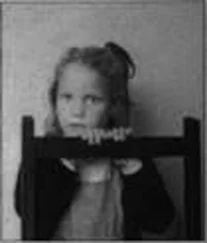Suzanne finishes her coffee. “Of course you can see her. She is still at the hospital. I can take you there, or your mother can later.”
“My mother is in Japan,” says Margaux.
“Your father can take you,” says Suzanne, getting up. “I have to go now. So many things to do. Paperwork. The funeral. I want it to be a lovely funeral.” She pauses and bites her lip. Her mouth twitches. “For my lovely daughter.”
She quickly turns away, but I see her face crumble. She scoops up the bag and clothes and heads out. When she gets to the door, she squares her shoulders, like a soldier getting ready for battle. My admiration for her is immense.
“See you later,” she whispers, not looking up, opening the front door and fumbling with the handle.

I seem to be spending a lot of time in hospital morgues, I reflect, as Margaux and I wait at la Pitié-Salpêtrière to see Pauline’s body. This Parisian one is a tenebrous, depressing affair compared with the luminous place Angèle works in. No windows, the paint is flaking, the linoleum scratched, and no effort seems to have been made to cheer up the room. We are alone, and the only sounds we hear are footsteps clicking up and down the corridor and the murmur of low voices. The mortician is a portly man in his forties. He offers no words of condolence, not even a smile. He probably deals with so many deaths that he has become blasé. Even a fourteen-year-old dying of heart failure means little to him, I guess. But I am wrong. When he comes back to get us, he leans toward Margaux and says, “Your friend is ready. Are you going to be all right, miss?”
Margaux nods, her chin set.
“It’s not easy seeing someone you love dead. Maybe your dad should come with you.”
My daughter looks up at him, taking in his bad, florid skin.
“She was my best friend, and I saw her die,” she says in a clenched, tight voice.
She will be saying that sentence for the rest of her life. The mortician nods.
“Your father and I will be just behind the door in case you need us, okay?”
She stands up, smoothing out her clothes, her hair. Her face once again looks years older. I want to hold her back, to protect her, to wrap her up in my arms. Will she be all right? Will she be strong enough? Will she collapse? Will this damage her forever? I fight the urge to grab her sleeve.
The mortician leads her to the next room, opens the door for her, and lets her in.
Suzanne and Patrick appear with their son. We hug and kiss in silence. The little boy is pale, tired. We wait some more.
Then Margaux’s voice is heard. She says my name. Not Dad, but Antoine. She has never called me that before. She says my name twice.
I enter the room. It has the same proportions as the one in Angèle’s hospital. I recognize the familiar, dominant smell. I allow my eyes to flicker toward the body laid out in front of us. Pauline seems very young. I come closer. So young, so frail. The shapely body appears to have shrunk. She is wearing a pink blouse and jeans. Converse sneakers. Her hands are crossed on her stomach. I glance finally at her face. No makeup. White, pure skin. Her blond hair combed back simply. Her closed mouth has a natural look to it. Angèle would approve.
Margaux hovers near me. I put my hand on the back of her head, as I did when she was small. She doesn’t shrug me off the way she has been doing lately.
“This is something I don’t understand,” she says.
She slips out of the room. I stand in front of Pauline’s body, alone. Astrid will not see this. She is still in Tokyo, flying back for the funeral on Tuesday. Serge and she could not change their reservations at the last minute. The last time she saw Pauline was probably at Malakoff, a week or so ago. When Astrid lands, Pauline will be in her coffin, ready for burial. She will never lay eyes on Pauline in death. I don’t know whether this is better for her or not. I have never faced this sort of situation with my ex-wife.
As I stand here, I think of my father. Like Pauline, my mother died in a couple of minutes. Had my father stood like this in the hospital morgue, contemplating his wife’s body, trying to cope? Where was he when he was told his wife had died? Who had called him? No mobile phones in 1974. He was most likely at his office, which in those days was near the Champs-Élysées.
I stare at the dead face in front of me. So young. So fresh. Fourteen years old. I put my hand on her head, gently. Compared with Margaux’s head, Margaux’s living warmth, Pauline is stone-cold. I have never touched a dead person in my life. I leave my hand there. Goodbye, Pauline. Goodbye, little one.
The dread that I felt last night while I was holding Pauline’s bag engulfs me. Her colorless face suddenly seems to melt into Margaux’s face. I shiver. This could be my dead daughter. I could be looking at my daughter’s dead body. Touching her corpse. I try to stop myself from trembling. I wish Angèle were by my side. I think of the comfort she could give me now, her common sense, her inner knowledge of death. I try to imagine that it was Angèle who tended to Pauline’s body, with the care and respect I know she gives her “patients.”
A hand on my shoulder. Patrick. He says nothing. We both stand there and look down at Pauline. He can feel me trembling. He squeezes my shoulder, in silence. I go on shaking and think of everything Pauline could have become. Everything that was in store for her that she will never know, that we will never know. Her studies. Traveling. Boyfriends. Independence. Her career. Love. Motherhood. Middle age. Growing old. Her entire life. What lay ahead and what is no more.
The dread in me abates, and anger takes over. Fourteen years old. For the love of God, fourteen years old. Why do these things happen? And when they do, how on earth do you pick yourself up and move on? Where do you find the courage, the strength? Is religion the answer? Is that where Patrick and Suzanne find solace? Is that what is helping them now?
“Suzanne dressed her. Alone. She didn’t want anyone else to do it,” says Patrick. “We chose her clothes together. Her favorite jeans, her favorite blouse.”
He reaches out and softly strokes his daughter’s cold cheek. I look at the pink blouse. The image of Suzanne’s fingers painstakingly doing up that long line of buttons against Pauline’s lifeless skin comes to me and weighs down on me with all its horrific might.

Margaux needs to be with Suzanne and Patrick. I guess it’s her way of staying close to Pauline. As I leave la Pitié, I check my phone. There is a voice message from my sister. “Call me, urgent.” I find Mélanie’s voice strangely quiet, but I am so upset by what I have just seen, Pauline’s body, that I don’t mention it when I first get her on the phone. I then tell her hurriedly about Pauline’s death, Margaux, the horror of it all. Astrid’s absence. Margaux’s period. Pauline’s body. Patrick and Suzanne. Suzanne dressing Pauline-
“Antoine,” says Mélanie pointedly, interrupting me. “Listen.”
“What?” I say almost impatiently.
“I need to talk to you. You need to come now.”
“I can’t. I’m about to head back to the office.”
“You have to come.”
“Why? What’s up?”
A short silence.
“Because I’ve remembered. I remembered why I had the accident.”
A bizarre apprehension plucks at my heart. I’ve been waiting for this moment for the past three months. It is now here, it is at last here, and I don’t know if I can face it. I don’t know if I am strong enough. Pauline’s death has drained me.
Читать дальше













